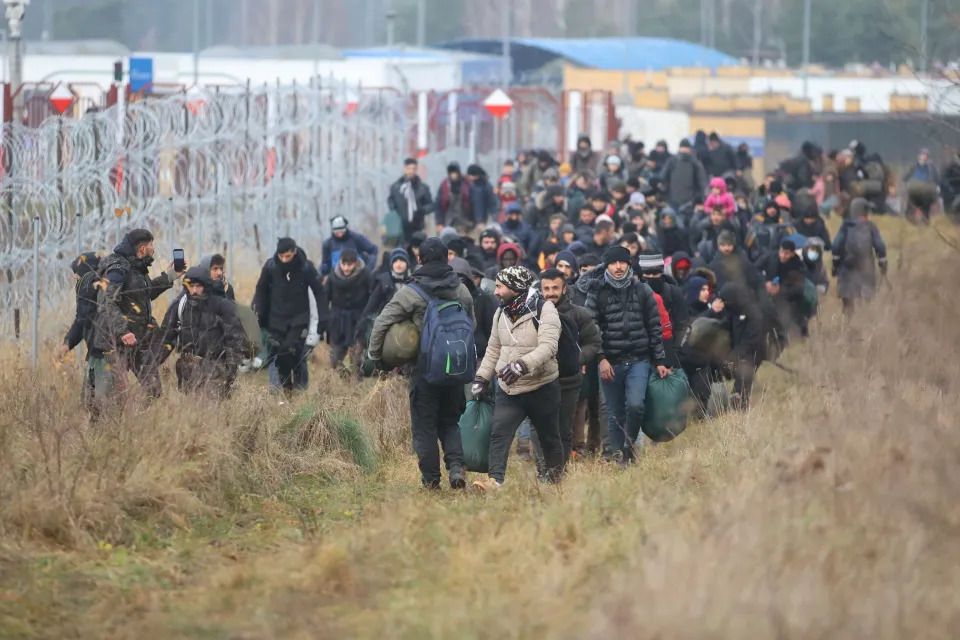|
|
TODAY.AZ / Society
Global Baku Forum: Glimpse of hope for solving migrants' problems [ANALYSIS]
16 March 2024 [08:30] - TODAY.AZ
 By Qabil Ashirov
By Qabil AshirovMigration has been the biggest challenge for mankind throughout history. Except for the very tight circle in society, it has satisfied neither migrant-receiving nor migrant-sending (origin) societies. The 11th Global Baku Forum will discuss the old issue and ways to solve it will be voiced.
It is worth noting that the history of migration dates back to prehistoric times. Scarcity of food, dangers of predators, natural disasters, and so on made cave-dwellers change their living places. Unfortunately, despite passing thousands of years, similar issues force people to leave their homelands and find new ones. A well-developed transportation even further accelerated migrations.

Migration is a big blow for origin countries. It depletes workforces and hinders the development of migrant-sending countries. For example, modern-day Eastern European countries suffer from a deficiency of workforce due to the high migration of their population to Western European countries after becoming a member of the EU. As a result, SMEs cannot afford to pay high salaries, which causes further unemployment. So, subsequently it causes a vicious circle.
Some could claim that migrants could help a country of origin through remittance. Besides, when the migrants return they could bring know-how to the countries of origin. However, in practice, it works totally differently. First of all, remittance could assist in handling foreign exchange deficit and bring economic activity to some extent within the country but it simultaneity brings disbalance. The price of some services or products becomes available only for some people not for all. For example, remittance from Russia has caused the prices of real estate to ramp up in some of the former Soviet republics. As for bringing know-how to the origin country by coming-back immigrants, it works in theory, but actually the majority of migrants do not return, or return in old age. Turkiye is the best example of it. The Turkish migrants, who moved to Germany in the 1960s, and their children did not return back even if the German government offered money in the 1980s.
In addition to economic impacts, migration has a social and psychological impact, as well. First of all, it separates families. Some children grow up rarely seeing their fathers, or old folks spend their time by waiting for the way of their children.
However, migrants and receiving countries suffer sociologically and psychologically, as well. As is known, not all migrants are highly skilled workers. Most of them are unskilled employees who work for minimal wages. They are obliged to share one flat and to live in unbearable conditions. In addition, they encounter racism, and all faults and blames in domestic policies are put upon them.
As for migrant-receiving societies, for them, everything is not as good as some media outlets claim. Due to the high migration, the price of real estate and rents ramp up. Some former Soviet republics and Turkiye witnessed it after the inception of the Ukrainian War. The prices jumped up as a flood of Ukrainian refugees and Russians who escaped from the war came to the said regions.
Migrants create plenty of workforces for society which enables business facilities to exploitate not only them but also local people. In some countries, due to migrants minimal wage has not been raised for years. Besides, due to the surplus workforce, some business people demand local people and even highly skilled ones to work under prices. As a result, hatred emerges among the local people against the migrants which sometimes leads to racism. Thus, here poses a question: "Who benefits from migrants?"

Even some people claim that migration or migrants bring wealth to this or that country. They enjoy counting migrants who built good careers such as Steve Jobs, Parviz Morad Omidyar, Sergey Brin and so on. However, they are the tip of the iceberg. The other side of the medallion is totally different which has caused hot debates among the Western intellectuals for 150 years. American writer Upton Sinclair called the migrants wage slaves. The writer presented himself as a migrant from Eastern Europe and worked among them for weeks to write his famous semi-documentary book titled Jungle more than one hundred years ago. The book describes the unbearable lives of migrants and how they are exploited. Following his research, Upton Sinclair points out that big American corporations try their best to bring migrants to the USA to suppress workers' movement and force them to work cheaply.
Upton Sinclair is not the only person who calls migrants slaves. For example, the Anti-Tom literary series compares migrants with slaves and comes to the conclusion that slaves have more bearable lives.
It is enough to watch any documentary films about the lives of migrants in Southern Italy, Spain, and other Western countries to see that nothing has changed since Upton Sinclair. Nobody benefits from migration except, some big corporations. Ironically, these big corporations cause reasons such as wars, droughts, environmental catastrophes, and so on.
We hope that the 11th Global Baku Forum will be one of the means to solve modern slavery, and the insight of migrants and migration will be erased from history forever. Peace and prosperity will hug the earth and the need for migration will disappear.
URL: http://www.today.az/news/society/246059.html
 Print version
Print version
Connect with us. Get latest news and updates.
See Also
- 14 January 2026 [15:19]
Azerbaijan participates in 298th IPU Executive Committee Session in Doha - 14 January 2026 [11:24]
Interviews begin for WUF13 Volunteer Program in Baku - 14 January 2026 [11:02]
Armenia publishes framework for TRIPP transit route - 14 January 2026 [09:23]
Footage of President Ilham Aliyev's meeting with residents of Aghdara posted on his social media - 13 January 2026 [15:42]
Defense Ministry, Military Prosecutor sign plan to prevent violations in armed forces - 13 January 2026 [15:28]
Protocol signed following 6th meeting of Azerbaijan-Italy Intergovernmental Commission - 13 January 2026 [12:57]
Bilasuvar customs intercepts nearly 20 kg of marijuana disguised as cabbage - 13 January 2026 [12:57]
Bilasuvar customs intercepts nearly 20 kg of marijuana disguised as cabbage - 13 January 2026 [11:35]
Military unit conducts tactical training exercise under 2026 Armed Forces plan - 12 January 2026 [12:18]
New mygov services eable online drone permits and UAV registration
Most Popular
 Germany’s Merz visits India to boost trade, security and labour ties
Germany’s Merz visits India to boost trade, security and labour ties
 Terrorist Vladimir Solovyov threatens Armenia and Central Asian countries with war
Terrorist Vladimir Solovyov threatens Armenia and Central Asian countries with war
 Defense Ministry, Military Prosecutor sign plan to prevent violations in armed forces
Defense Ministry, Military Prosecutor sign plan to prevent violations in armed forces
 Azerbaijan’s green energy push opens new opportunities for Dutch partnership
Azerbaijan’s green energy push opens new opportunities for Dutch partnership
 Ukraine releases footage of night drone strikes on Caspian Sea oil platforms
Ukraine releases footage of night drone strikes on Caspian Sea oil platforms
 Trade is changing logic of Azerbaijan-Armenia relations: market before and after
Trade is changing logic of Azerbaijan-Armenia relations: market before and after
 Iran protests death toll reportedly surpasses 500
Iran protests death toll reportedly surpasses 500
